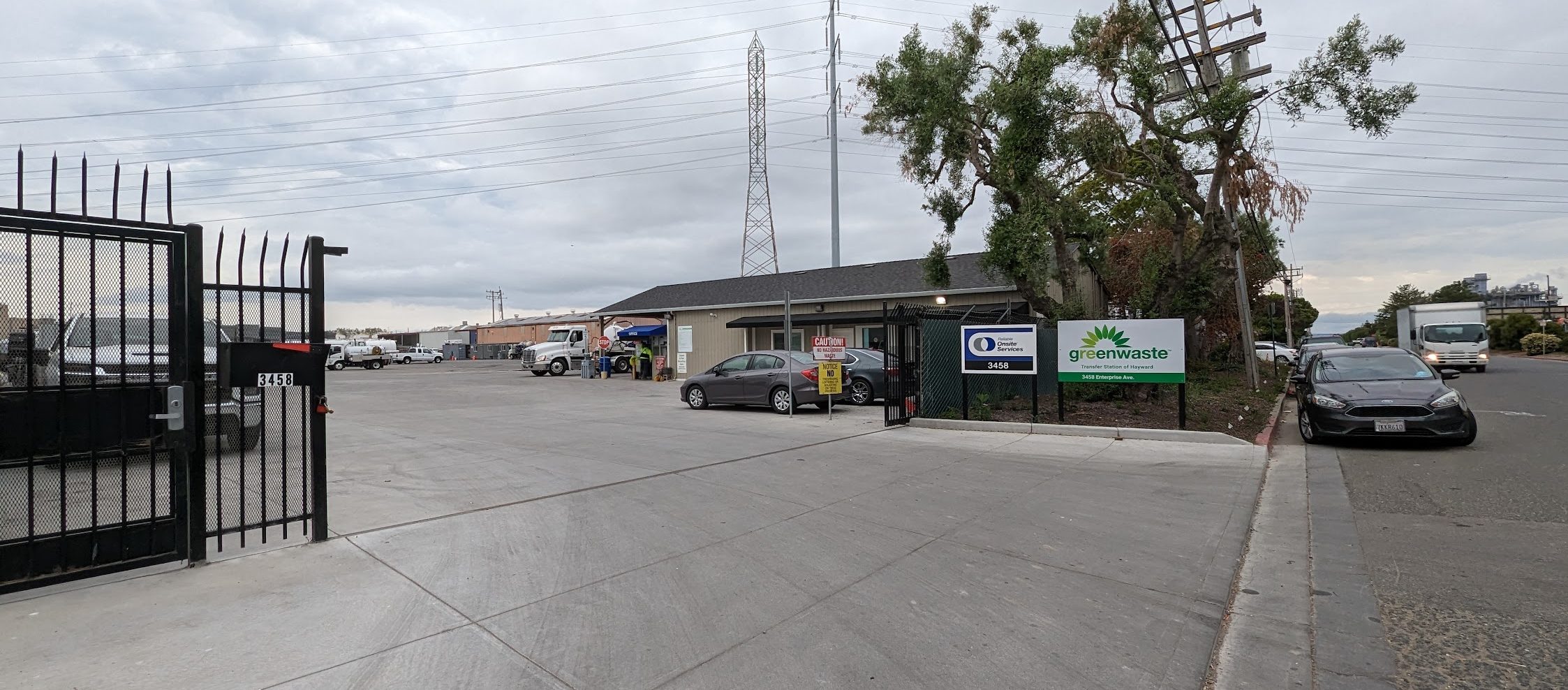GreenWaste Hayward Transfer Station
Drop-off construction and demolition debris and bulky items for recycling.

Visit Us Today
What We Recycle
Carpet
Carpet must be:
- Dry
- Free of tack strips, nails, and other debris
- Cut into 5’ widths, no smaller than 3’ with the backing to the outside
- Separated from carpet pad
Contaminants on carpet that will designate load as trash include:
- Paint and drywall mud
- Bodily fluids
- Chemical or pharmaceutical contaminants
Loads containing excessive amounts of padding will designated as trash.
Clean Concrete
Source separated concrete from building pads, driveways, road construction, etc. May include native stone and asphalt, with minimal flush-cut wire or rebar. No dirt, base rock, brick, roofing tiles, wood, or trash.
Mixed Concrete
Concrete and asphalt containing some wire or rebar and a small amount of dirt or base rock. No brick, roofing tiles, wood, or trash.
Demolition Debris
Loads coming from demolition sites that contain over 75% recyclable items such as lumber, drywall, concrete, brick, tile, granite, rigid plastics, OCC, paper, metals, brush and trees, rock, asphalt, windows, appliances, and toilets.
Construction Debris
Loads coming from construction sites that contain over 75% recyclable items such as lumber, sheetrock, concrete, brick, tile, granite, rigid plastics, OCC, paper, metals, brush and trees, rock, asphalt, windows, appliances, and toilets.
These loads will be classified as trash or miscellaneous debris if they containing excessive amounts of trash.
Clean Fill Dirt/Sod
Dirt and sod.
Drywall
Source-separated drywall.
Mixed Drywall
Drywall that contains nominal amounts of other items such as Visqueen, ceiling tiles, wood, or other debris. These loads are normally generated during new construction, not by demolition.
May be classified as trash or miscellaneous debris if containing excessive amounts of trash.
Mixed Debris
Examples of mixed debris include house clean-outs, appliances, non-varnished furniture, cardboard, paper, and construction debris hauled by a self-haul vehicle, junk hauler, or contractor.
If the materials contain a high percentage of non-recyclable materials, the load will be considered trash or miscellaneous debris. Yard waste, brush, car and RV, and treated wood parts are not accepted.
Wood Shingle Roofing with Tar Paper
Source-separated wood shingles that include tar paper.
Mixed Wood Shingle Roofing with Tar Paper
Mixed wood shingle roofing with tar paper loads can contain small amounts of asphalt shingles, trash, tar and gravel roofing, and plastics.
May be classified as trash or miscellaneous debris if containing excessive amounts of trash.
Tar and Gravel Roofing – Clean
Source-separated roofing materials containing roofing felt or paper, tar, and assorted gravel materials.
Tar and Gravel Roofing – Mixed
Tar and gravel roofing materials that include some amount of wood, metals, or bags comingled in the load.
Composite Asphalt Roofing – Clean
Source-separated residential/asphalt roofing shingles that do not include tar and gravel roofing or commercial roofing tear-offs.
Composite Asphalt Roofing – Mixed
Residential roofing shingles loads that include some amount of wood, metals, or bags are commingled in the load.
Stucco and Plaster
These loads contain stucco, plaster, pool plaster or gunite. Loads must not be wrapped in Visqueen or contained within garbage bags or boxes. Please place Visqueen in a trash bag at the front of your load.
Loads containing bagged stucco/plaster or excessive trash, wood, etc. will be designated as trash.
Trash
These are materials that should go directly into the outgoing trash pile.
Loads classified as trash may include laminated wood, painted wood, sawdust, insulation, PVC pipes, film plastics and other packing materials, asphalt roofing, roofing felt, roofing insulation, fiberglass insulation, vinyl flooring, ceiling tiles, stucco, soil, asphalt, windows, doors, carpeting, carpet padding, furniture, cabinets, sinks, furniture and styrofoam, crushed materials, mattresses, rubber tiles, ground rubber materials, textiles and linen, couches, chairs, desks, office partitions, signs, foam board, cabinets, wet materials, Visqueen, composite type materials, and/or materials contained in trash bags.
Yard waste, brush, car and RV, and treated wood parts are not accepted at this facility.
Diversion Rates
Recycling Fees
Forms
Hours and Contact
Diversion Rate
|
Diversion Rate
|
||
|---|---|---|---|
80.11% |
62.92% |
The GreenWaste Hayward Transfer Station has its diversion rates third-party certificated by the independent Recycling Certification Institute (RCI).
Diversion rates are based on the total tons of incoming materials vs. the total tons of waste landfilled. A separate calculation shows the recycling rate, less alternative daily cover (ADC).
Rate structure effective February 17, 2025
- Download our rate sheet and directions (PDF – English and Spanish included)
- Review our Description of Materials
Prices subject to change, call our office at 510-606-1548 for any questions.
There is a half-ton minimum charge on all items per vehicle. Measurement of load is by volume with no allowance for air space. A load checking program is in effect.
Hazardous waste, yardwaste, brush, car and RV, and treated wood, wet garbage, and food waste are not accepted.
Choose the type of online application:
Credit Card:
Regular Facility Hours
Mon – Fri: 7 AM – 4:30 PM
Sat: 7 AM – 3:30 PM
Closed Sunday
Holiday Schedule – Close Early
Memorial Day: 7 AM – 2 PM
Independence Day: 7 AM – 2 PM
Labor Day: 7 AM – 2 PM
Christmas Eve: 7 AM – 2 PM
New Years Eve: 7 AM – 2 PM
Holiday Schedule – Closed
Easter
Thanksgiving
Christmas Day
New Years Day
Address
GreenWaste Hayward Transfer Station
3458 Enterprise Ave.
Hayward, CA 94545
Phone
510-606-1548